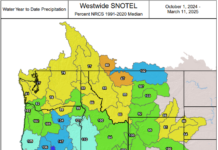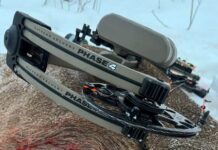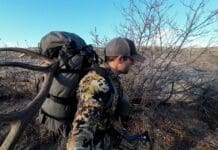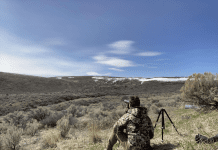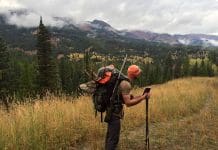Backcountry Food
by Rokslide Staff
Heading over to the local grocery store or 7-Eleven won’t be an option on a backpack hunt and the saying, “what you’ve got is all you’ve got,” will never ring more true. The food you choose to bring on a backcountry hunt can be as important as the weapon in your hand, and without some pre planning, you can get yourself into trouble real quick. If you don’t bring enough food you can talk your way off the mountain pretty easy, but if you bring too much, you’ll be packing unneeded weight and killing yourself on the hike in. To avoid hunger, loss of energy and over packing on an extended hunt, you’ll need to take a hard look at exactly how large your caloric intake needs to be to stay focused and what your taste buds can handle for backpacking food.

Below, you will find what types of food and caloric intake Rokslide staff members have found that do a great job of effectively fueling their bodies while hunting hard in the backcountry.
Amy Hanneman
Here is what I take for a seven day hunt. It is roughly a 2000 calorie a day diet.
14 Clif Builders protein bars
7 Power Bar energy gel
7 tea bags
7 Mountain House meal (the smaller sized vacuumed sealed kind)
2 lbs of jerky
2 dried fruit and nuts
7 Emergen-C vitamin packs
I always start my day by drinking a liter of water and then adding an Emergen-C pack to the last 50ccs. I won’t eat my first protein bar until I am feeling hungry since I am not always ready to eat first thing in the morning. I snack on jerky, dried fruit and nuts throughout the day, and will have a second protein bar for lunch. Dinner consists of a yummy, hot Mountain House and then it is off to bed!
David Long
Following is my daily menu which remains the same virtually every day:
Breakfast: PROBAR Meal Replacement Energy Bar (350-390 calories & 45 carbs). I typically eat this while I am glassing. On colder mornings, I will spoil myself with a Starbuck’s VIA coffee. The VIA coffee packets are the coolest thing since sliced bread.
Mid-morning snack: One package of GU Chomps – these have 180 calories and 46 carbs per package. Not only do they offer that much needed spark, they are one of the best tasting backcountry food items I have found. Lots of different flavors.
Lunch: A couple of flour tortillas with honey and peanut butter. Wash them down with lots of water and GU Brew electrolyte tablets. For dessert, I like to have one GU Roktane gel – these only weigh one ounce and provide 100 calories and 25 grams of carbs.
Mid-afternoon snack: I package of GU Chomps (carbs) and a Clif Builder’s Bar (protein).
Dinner: One single serve Mountain House dehydrated meal. I prefer the Pro-Pak meals because they are vacuum packed and take up less space. They only weigh 4 oz each and have around 450-500 calories. I normally take a variety of dinners but by favorites are Beef Stroganoff with Noodles, Beef Stew, Chili Mac with Beef, Macaroni and Cheese, Sweet and Sour Pork with Rice and Lasagna with Meat Sauce. One word of advice: If you do take the Lasagna with Meat Sauce, save it for the last night. I am not sure what the cheese is made of, but once it attaches itself to your spoon, it doesn’t come off. If you eat the Lasagna the first night, the cheese will remain on your spoon the entire length of the hunt – guaranteed! I wash it all down with water and more GU Brew electrolyte tablets. On colder evenings, I will add the electrolyte tablets to hot water which makes a nice drink before hitting the bag.
Aron Snyder
I’m lucky enough to spend a great deal of time in the wilderness and have gotten my daily caloric intake and food list down to a science. Everyone is going to be different, but here’s my list of food that I take on the majority of multi day hunts that I do:
Breakfast (500 calories) 2 cups of granola mixed with 1 cup of protein powder and a zip lock bag.
Morning snack (380 calories) Supreme protein bar
Lunch (800 calories) one meal pack bar with two Justin’s chocolate peanut butter packs and a Honey Stinger Gold pack all mixed together.
Afternoon Snack (380 calories) Honey Stinger mint chocolate chip protein bar and a Wilderness Athlete berry Blast
Dinner (500 calories) I usually eat a chicken and rice Mountain House meal mixed with a little Tabasco sauce.
Throughout the day I will also consume Wilderness Athlete Hydrate and Recover drink mix and an assortment of carb/energy shots from Hammer nutrition and Wilderness Athlete.
The key to success when packing food is finding out what your body needs to maintain a high level of energy and get a realistic amount of enjoyment from the food you’re eating.
Bryan Martin
Breakfast (400-600 calories):
Oatmeal (either packaged or homemade (better). Can add Wilderness Athlete Meal Replacement powder to it, powdered milk, nuts, chocolate chips, dried fruit, nuts, etc. or
2 meal replacement/energy bars
Lunch/snacks (1000-1800 calories):
Small meat snack (piece of jerky, pepperoni or Sardine)
1 candy bar (good taste)
Ziploc bag of trail mix and/or some dried fruit and/or nuts: almonds are my favorite (raw and unsalted)
2-5 power/granola or energy bars (depends on caloric requirements)
Drinks:
Wilderness Athlete drink mix: 1 of each/day.
Crystal Light (optional), but it is not as good for you with the artificial sweetener.
1-2 tea bags per day (I don’t drink hot choc or coffee, but they are options also). Hot cider is tasty too.
Wilderness Athlete Green drink mix (put in Ziploc bags with little scooper)
Wilderness Athlete meal replacement powder to add to water (optional)
Dinner (400-700 calories)
1 Mountain House freeze-dried dinner. (Pro-pak for less wt and bulk and fewer calories (20% less than standard meal). Can add boil in a bag rice or Top-Ramen Noodles for additional calories.
Salt/pepper/seasoning for meals and if you want to boil any meat.
Multi-vitamins like Usana (I get the ones in daily/sealed packets) or Wilderness Athlete.
Amino Acid to help with muscle recovery (see Protein/meal replacement drink)….best to take a little throughout the day or with meals and also helps with recovery.
Darin Cooper
I like to keep my meals consistent and simple while I’m backpacking. The biggest challenge is providing enough calories to keep your body from getting run down during a strenuous hunt. I like to pack each day’s food in separate 1-gallon freezer bags. This keeps the food organized and helps me ration the meals so I don’t run out of food early.
Breakfast – I start every morning with two packs of instant oatmeal – I prefer the lower sugar varieties for a more sustained energy release throughout the morning. I mix the oatmeal packets with a scoop of whey protein. If I’m in a hurry I can mix this in a hard plastic bottle with cold water and chug it in a matter of a minute or so, but it’s nice to have it hot on cooler mornings. I pre-mix these breakfast bombs in smaller, sandwich-sized Ziplocs for convenience.
I love PB&J in the mountains! Peanut butter provides high-calorie, slow-burning fat and protein while the bread and jelly can give you a quick hit of energy. I don’t build sandwiches before my trip because they turn into mashed crepes after about a mile of backpacking. I just bring a small plastic peanut butter jar and a small plastic jelly container (squeezable is a bonus). I’ll pack enough bread (in the very top of my pack) to allow me two sandwiches per day which I typically make just before I rack out for the night and put them in individual sandwich bags. I’ll knock down a sandwich around noon and another later in the afternoon before the action gets going in the evening.
I always pack a snack bag within the daily food bag. It contains a couple energy bars – I like the Wilderness Athlete bars for the taste and nutrition, but I like to bring a few goodies to snack on throughout the day. I like jerky, cookies, trail mix, nuts, and candy bars. I normally stay out all day – napping & snacking on the mountain when things are slow.
For dinner I like hearty Mountain House or Alpine Aire dehydrated meals. They’re lightweight and reasonably nutritious. Perhaps my hunting partner and I are pigs, but it seems like the meals for two are really meals for one and the meals the serve 4 are about right for two guys. On especially strenuous or cold hunts I like to supplement the dehydrated meals with about ¼ cup of couscous grain/person for added calories and protein. Add water equal to about 1.5 X the volume of couscous you add to the dehydrated meal you’re preparing. For ¼ cup of dry couscous, add about 3/8 cup of water to the recipe. This adds about 130 calories, 4 g protein, and 27 grams of carbs.
My last piece of advice is to drink more water than you think you need. Exertion at high altitude extracts so much water from the body it’s nearly impossible to stay well hydrated – unless you consciously and religiously drink you can easily tip the scales toward dehydration. By the time you’re experiencing the symptoms (chapped lips, dark yellow pee, muscle cramps, headaches, etc…) it’s too late. Your ability to hunt hard is dramatically affected, and you have to take time out of the hunt to focus on rest and rehydration. The bottom line is – being well fed won’t keep you in the game unless you keep yourself hydrated.
Jared Bloomgren
Although not the best in saving weight; I have been using Meals Ready to Eat (MRE) when going into the backcountry. I have been able to sustain myself for 17 days with these meals and a few more supplements. Other essentials include dried jerky, Emergen-C powder to help my immune system and electrolyte displacement, Gatorade powder to rebuild lost electrolytes, raisin/nut/m&m trail mix, snickers bars. Each MRE contains 2500-4000 calories that will give you plenty of energy throughout the day. I eat the bread/crackers portion with the peanut butter or cheese in the morning with Emergen-C water mix. I eat the main course of the meal in the late afternoon and snack on jerky/trail mix and Gatorade throughout the day. I have found to never be at a loss for energy.
Justin Davis
When doing a 5-7 day backpack hunt, my list looks something like this:
1 two person Mountain House freeze dried meal per day. I can eat half for lunch and the rest for dinner (total of 5-7).
2 Wilderness Athlete energy bars per day (10-12 total).
Bag of deer or elk jerky.
2 instant oatmeal packets per day for breakfast (10 total). Warm breakfast is pretty good in the cool morning.
A couple of hot chocolate packets. Hot chocolate can be a treat in the backcountry.
Handful of Starbucks instant coffee packets in the arsenal. Good pick me up as the days wear on.
Bag of trail mix in ziploc baggies. Good snack during the day.
5 Clif shots
1 MRE as emergency food source. I sometimes pick this over and get the goodies out of it during the hunt.
1 bottle of Mio for flavoring water (I like the strawberry-banana).
Rebecca Francis
On a backpacking trip, every last ounce counts, so I am very careful to take only what I need. My breakfast consists of a packet of oatmeal per day followed by a Clif protein bar later in the morning. Each morning I also drink a packet of EmergenC for the added nutrients, electrolytes, and antioxidants due to the extra stress I will be putting on my body. For lunches, I plan one bagel with one slice of homemade elk summer sausage and two slices of Tillamook medium cheddar cheese. I also have a very small plastic container of honey mustard to spread on the bagel. It is a lightweight, quick, and tasty lunch that is filling and packed with carbs and protein. For snacks, I pre make my own granola mix, and take one sandwich size bag to munch on for the week, as well as a sandwich size bag of a dried fruit mix. I take one Clif bar or nutroll per day, and usually throw in a small bag of jerky or tuna. I also plan for one Gu per day for a quick burst of energy in the afternoon. For dinner I take one freeze dried mountain house meal per day. I love the seafood chowder and turkey tetrazzini. On a lot of our backpack hunts I will take a lightweight collapsible fishing pole to supplement my diet with fish. In Alaska, there are several types of berries that I continually snack on for the additional vitamins and minerals they provide. My weakness, I always take a sandwich size bag of gummy bears for my sweet tooth and claim it is another form of much needed energy.
Robert Hanneman
Here is what I take for a seven day hunt. It is roughly a 2500 calories a day diet.
14 protein bars (assortment of different kinds)
14 candy bars (assortment of different kinds)
14 Power Bar energy gel
7 hot chocolate mix
7 Mountain House meal
7 instant oatmeal
2 1/3 lbs of jerky
3 ½ bagels
7 Emergen-C vitamin packs
1 Mountain House dessert (for celebration after the kill)
First off, I want to say I have hunted with a lot of guys that are always eating a lot better than I am, but my menu does work for me. My day starts out with oatmeal and hot chocolate. The next time I will sit down to a meal is dinner so between dinner and breakfast I eat two candy bars, two protein bars, two Power Bar energy gels, and 1/3 pound of jerky. Dinner is a Mountain House dinner with a half of bagel torn up and mixed in.
The big thing for me in selecting food to pack is that it must be at least 100 calories for every ounce of weight in order for me to acknowledge it as worth taking.
Scott Mansor
When back country hunting it is usually necessary to leave camp very early in the morning in order to be in position to glass at first light. One of my favorite food items to take on these trips is ready to eat breakfast cereal. You can buy several different brands of this or make your own very easily. I usually make my own by mixing 1-1/2 to 2 cups of my favorite cereal with 1/3 to ½ cup of dry milk mix in a 1 qt Ziploc freezer bag. You only need to take a few seconds break in your glassing to pour in a little water, close the bag & mix it up. Pull out your pocket spoon and have a simple tasty breakfast that takes virtually no time to stir up. You can add freeze dried fruit, nuts etc. as desired.
Another favorite of mine is homemade jerky. I always vacuum pack my jerky and freeze it so there’s always some available for hunting, scouting or just backpacking trips. Most of mine is made from wild meat but occasionally I will buy a couple of beef roasts when out of wild meat. Even goose makes great jerky.





